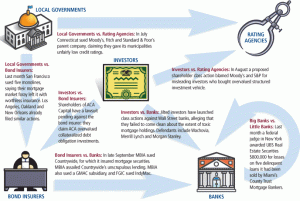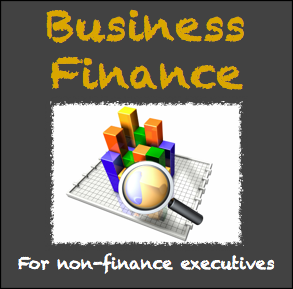For almost two years, I have been writing a regular column for the North Bay Business Journal, a publication of the New York Times, a weekly business newspaper which covers the North Bay area of San Francisco – from the Golden Gate bridge north, including the Wine Country of Sonoma and Napa counties.
**********************************************************************************
Article References
- Estimate of TARP’s cost to Taxpayers Increases
- $296 Billion in Overruns in U.S. Weapons Programs
- Executives Took, but the Directors Gave … corporate governance issues
- Even Rick Wagoner’s Firing Got Lousy Mileage … another POV
- Wagoner didn’t deserve it … BW Featured Column
- We’re Not the Boss of A.I.G. … Carl Icahn on the realities of corporate governance
Article published – April 13, 2009
BUILDING A BUSINESS: Government’s awkward, costly intervention in economy
Only better corporate accountability, innovation can lead American industry
by Lary Kirchenbauer
I can’t help myself this week. The mounting encroachment by the federal government across the terrain of American enterprise is very troubling, so I hope you’ll join me as we take a slight detour to address a few of these issues.
I understand the outrage over the egregious pay packages, bailout bonuses and inscrutable investment products of many of the nations’ major financial institutions. I also understand the unsettling power of the lender of last resort. Yet, to ignore the federal government’s track record is like overlooking a cliff when climbing the Matterhorn. Two recent and provocative reports serve as vivid reminders of the federal government’s woeful track record and ineptitude at managing large-scale enterprises.
The first painful reminder (you’ll find links to these and related articles above)) was recently issued by the oxymoronic, Government Accountability Office. The GAO found that nearly 70 percent of the Pentagon’s largest weapons systems were over budget last year for a combined total of almost $300 billion more than the original estimates, an amount the GAO called “staggering.” The GAO also found that the programs were behind schedule by an average of 22 months.
The Congressional Budget Office, in an unrelated report, quietly adjusted its estimate of the cost to American taxpayers of the $700 million Troubled Asset Relief Program, TARP, from the $189 billion amount estimated in January. That cost is now estimated at $356 billion, but heh, it’s only about $167 billion higher in just two short months … about an 88 percent increase. In just these two examples, almost $500 billion – that’s half of a trillion dollars – is at risk. Raise your hand if you would still have your job after overseeing debacles like these?
We can’t let our emotional outrage cloud our judgment about the extraordinary intervention that threatens the cornerstones of the democratic capitalist system. Are some reforms required? Certainly, but in many cases, existing institutions are already empowered to enforce sound, ethical business practices.
Where are the boards of directors who have the power, but apparently not the will, to deal with these issues? Shareholders have to be more aggressive in electing proactive, responsible directors in small companies as well as large ones. Boards of directors have clear legal responsibility to uphold their fiduciary duty to their shareholders.
Compensation committees of the board must implement sound pay-for-performance programs. Audit committees need to ensure the regular flow of reliable and consistent financial information. Hold the CEOs to high standards and coach them to success or make a change.
It’s easy to sacrifice the GM CEO, and maybe a little shaking up was necessary. The American auto industry, however, is under siege from the same forces of unemployment and lack of confidence that have created massive losses and sales declines at every auto company in the world, including heralded purveyors like Honda, Toyota and Nissan.
Unquestionably, the American auto industry should have done a much better job of being lean and mean in the face of the growing competition that has been apparent for years. GM’s losses as a result of its actions are monumental. But, sending in a government SWAT team for a week and concluding that they know how to rescue GM and solve the auto industry crisis is ludicrous.
It would be simple if everyone in America wanted to drive a dark grey Prius, but they don’t. Believing that a federal government task force can divine the inclination of the American public to buy a particular brand, style, color, engine type, etc., within a 2-4-6 year operating cycle, is equally specious. It’s tough enough for experienced business leaders to forecast these expectations, but until jobs and confidence are restored, no business operating in a market that has suffered a fifty percent decline will be easy to resurrect.
We need to remember that corporate governance, accountability, innovation and profitability are the hallmarks of American industry. Is there more work to be done? Yes. Can improvements be made? Yes. Is there a better free enterprise thriving somewhere else? Not that I know of. If you’re excited about government oversight and intervention, look at the Pentagon and TARP as examples of what happens when that happens.
•••
Lary Kirchenbauer is the president of Exkalibur Advisors Inc., providing practical business strategies for family and other privately owned businesses in the middle market. He works closely with senior executives and their businesses to accelerate their growth and improve personal and professional performance and hosts a CEO Round Table for middle market companies in the North Bay. Please visit his blog, The Daily Bull, at www.exkalibur.com




I followed your suggestion to read about you on ExKalibur.com I’m impressed and glad to know that you have intelligence and common sense. Too bad that you aren’t going to the Albion Reunion. I remember your good sense of humor. Thanks, Debby (Danziger) Britten